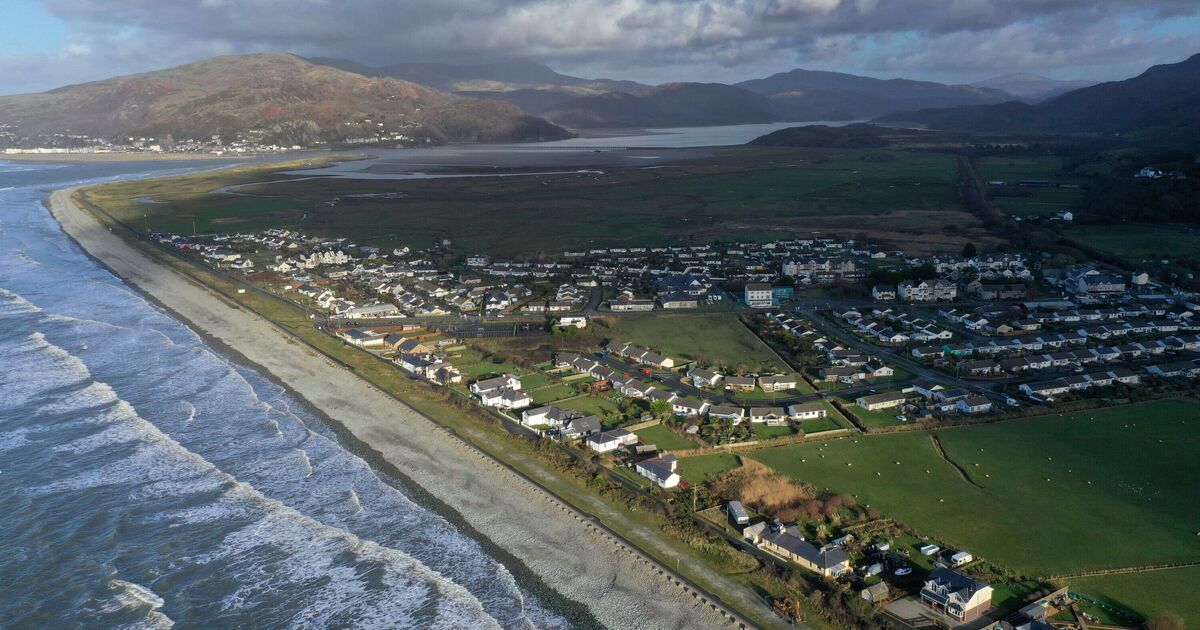
The village of Fairbourne, where villagers don’t know how long their community will exist (Image: Getty)
Fairbourne is a beautiful place. It sits on the coast of Barmouth Bay sandwiched between the sea and the mountains of Snowdonia. In most circumstances, it would be nothing short of perfect.
But in Fairbourne’s case, the sea’s presence is more sinister. It may, in time, swallow the village whole. And as things stand, no one in a position of power is going to do anything to stop it.
In 2013 Gwynedd Council decided that it could not defend Fairbourne from the elements in the long-term, reports WalesOnline. A Shoreline Management Plan for the west of Wales, first commissioned by the Cardigan Bay Coastal Group in 2009, “raises significant concerns over the future sustainability of the defence of Fairbourne”.
In short, there will be no money spent on defending this community of around 400 homes and 850 people after 2054 because it will not be safe or sustainable to do so. The harsh and unforgiving word ‘decommission’ has been used, which would mean the death of a community, its inhabitants forced to move out, its shops closed down, its houses demolished to make way for salt marsh.
The concerns over the viability of its long-term protection are based on climate change and the speed at which it continues to take hold, with sea levels forecast to rise by potentially two metres over the next century.

People in Fairbourne say they don’t know if they’ll be able to pass their homes down to their family (Image: Getty)
Villagers have even been described in some reports as the people who will one day become the UK’s first ever “climate refugees” – but not all of them want the label. Gwynedd Council, meanwhile, says it has not decided to ‘decommission’ Fairbourne, but has not ruled it out, admitting that such a step would “need to be considered”. What it has confirmed, however, is that it considers relocating residents a certainty.
Indeed, it is not only the sea that endagners low-lying Fairbourne, which also faces the risk of flooding from the nearby estuary and the river that descends from the hills.
Faced with the sort of risk few others in Britain face quite so starkly, or so publicly, villagers have little choice but to carry on their lives in this beautiful location as best they can, while trying to convince the authorities that something must be done to protect their village and their homes. Meanwhile, they say they have seen house prices plummet with some people already choosing to leave the village altogether.

Fairbourne’s location would almost be perfect if it wasn’t under such severe threat (Image: Getty)
It means many residents don’t know if they’ll be able to hand their homes, or their businesses, down to their children — or even how long their homes will even exist. Yet there are currently no measures in place for homeowners to receive compensation when they are made to relocate.
“Most people are seriously angry at how it’s been handled,” Stuart Eves, chair of the local community council, who has lived in Fairbourne for 43 years, told WalesOnline in 2019. “They’ve basically said ‘we’re going to come in and take this all down’. How can they say that based on supposition? Of course we realise that sea levels are rising, but at what rate? We know there’s going to be a problem, but what we don’t know is when.
“It’s destroyed the livelihood of the village. You can’t get a mortgage here anymore. There’s lots of young people here who want to stay and buy houses, but they can’t. Banks won’t give them the money.”

People still very much consider the village of Fairbourne home (Image: Getty)
Karen Lindsay, who runs a dog care service in the village, told WalesOnline earlier in 2024: “I’ve only recently brought my business here but I do know the climate change concerns have affected people in the area, especially anyone with a business there, and impacted property prices.
“We’re going to stick it out anyway as it was quite a cheap property anyway. It was kind of like we decided even with everything that could happen in the future it’s still worth investing time there because it’s still a good place to be. ”

Fairbourne is surrounded by sea and mountains (Image: Getty)
The West of Wales Shoreline Management Plan was developed by coastal groups including Natural Resources Wales, Gwynedd council and other councils with a shoreline on the west coast of Wales. It was adopted by the Welsh Government in 2013.
Gwynedd council told WalesOnline it set up the Fairbourne Moving Forward (FMF) to address the complex environmental issues at Fairbourne, in particular the village’s vulnerable position due to its location. The village began in the late 1800s on an area of low-lying coastal saltmarsh with the Mawddach river estuary to the north, the mountains of southern Eryri (Snowdonia) to the east and Cardigan Bay to the west. Two other rivers also flow through or near the village and into the Mawddach Estuary via tidal gates.
A Gwynedd council (Cyngor Gwynedd) spokesperson said: “Since being established, FMF has drawn upon expertise and knowledge from a range of local and national organisations and from the local community. As a local authority, Cyngor Gwynedd’s responsibility is to work with our partners to plan ahead to ensure the safety of people living in coastal communities at serious risk of flooding due to climate change. In this regard all decisions regarding the future of Fairbourne are taken in full consultation with the Fairbourne Moving Forward project board.”

‘You can’t get a mortgage here anymore’ says one villager (Image: Getty)
There are two main factors which drive global mean sea level rise: the addition of freshwater to the oceans from melting glaciers and ice sheets, and the expansion of ocean water as it warms up, which is a consequence of higher atmospheric temperatures. Both these factors are the result of climate change — the planet’s mean sea level rose higher in the 20th century than in any other century during the last 3,000 years.












